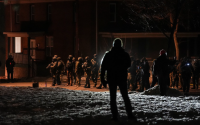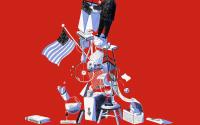 Belarus recorded its lowest temperatures in 100 years |
21 January 2006
Officials in those countries say there is growing pressure on energy supplies, with power shortages as Russia cuts deliveries to fight the freeze at home.
Dozens have died of the cold, with temperatures as low as -33C recorded.
Forecasters have said that the freeze will last several more days, and could intensify in places.
Strained grid
In eastern Ukraine, 10 people have died as a result of the cold.
Miners in the area have been told not to work as conditions underground have become treacherous.
The weather has strained Ukraine's national grid, with power cuts reported in hundreds of towns.
The BBC's Helen Fawkes in the capital Kiev, where it is several degrees warmer, says some people are complaining that their homes feel chilly, saying that their heating, which is run on gas, has been reduced.
Demand is believed to have risen by 20%.
In other developments:
Six people died in Latvia, where temperatures of -27C were recorded, the lowest in 100 years, AFP news agency reports
Heavy snowfalls, high winds and cold cause problems across northern Europe, causing major disruptions to transport and power supplies Flights from Copenhagen airport in Denmark were suspended for two hours on Friday evening as aircraft were de-iced. Traffic is not due to return to normal until Sunday Thousands of motorists are stranded as the Store Baelt bridge connecting Copenhagen with the central island of Fyn is closed In the Norwegian Arctic city of Tromso more than 20,000 people are left without power after heavy snow brings down electricity cables.New cold
Five more people died overnight in Russia's capital, Moscow, bringing the total number of dead across the country since Tuesday to more than 70.
 This car was covered in ice after a water pipe burst in St Petersburg |
Temperatures are expected to ease slightly over the weekend, but forecasters say more cold air will arrive from the east next week bringing a further drop.
The weather is the coldest to affect the country in more than 25 years.
Energy consumption has hit new highs as Russia struggled to keep warm in the severe winter conditions.
Many schools and businesses remained shut, electrical billboards turned off, cars were unable to start and trolley buses put out of action by snapped cables.






